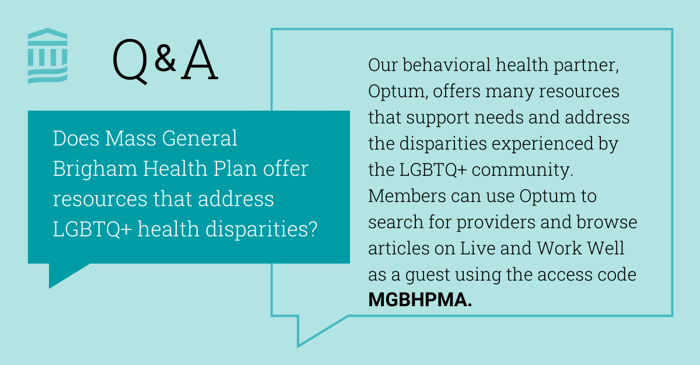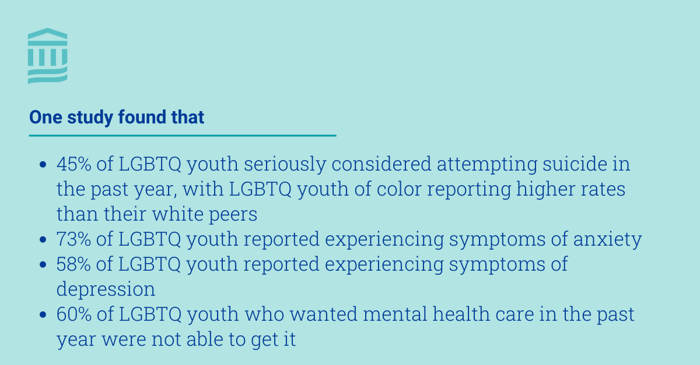Healthcare disparities within the LGBTQ+ community and how to address them
Pride Month is a time dedicated to celebrating the dynamic and diverse lesbian, gay, bisexual, transgender, and queer (LGBTQ+) community. It is also an opportunity for organizations and individuals to engage with the LGBTQ+ community and identify ways to support inclusivity year-round. Whether you’re a provider, employer, broker, or member, we invite you to educate yourself about some of the current healthcare disparities impacting the LGBTQ+ population, along with several supportive resources offered through Mass General Brigham Health Plan.
LGBTQ+ youth face a higher risk of mental health challenges
![]() A recent survey found that approximately 7.1% of Americans identify themselves as lesbian, gay, bisexual, or transgender, and the percentage only increases in the younger population. The survey found that 10.5% of millennials and 20.8% of Generation Z identify as lesbian, gay, bisexual, or transgender. With these growing statistics, it’s important to note that research shows LGBTQ+ youth are at a higher risk for substance use, sexually transmitted diseases, cancers, cardiovascular diseases, obesity, bullying, isolation, rejection, anxiety, depression, and suicide as compared to the general population.
A recent survey found that approximately 7.1% of Americans identify themselves as lesbian, gay, bisexual, or transgender, and the percentage only increases in the younger population. The survey found that 10.5% of millennials and 20.8% of Generation Z identify as lesbian, gay, bisexual, or transgender. With these growing statistics, it’s important to note that research shows LGBTQ+ youth are at a higher risk for substance use, sexually transmitted diseases, cancers, cardiovascular diseases, obesity, bullying, isolation, rejection, anxiety, depression, and suicide as compared to the general population.
This aligns with the Trevor Project’s 2022 National Survey on LGBTQ Youth Mental Health, which found that:
- 45% of LGBTQ youth seriously considered attempting suicide in the past year, with LGBTQ youth of color reporting higher rates than their white peers
- 73% of LGBTQ youth reported experiencing symptoms of anxiety
- 58% of LGBTQ youth reported experiencing symptoms of depression
- 60% of LGBTQ youth who wanted mental health care in the past year were not able to get it
Access to gender-affirming care can support health goals for LGBTQ youth
.png?width=400&height=400&name=Pride%20Month%20Learn%20how%20you%20can%20support%20the%20LGBTQ+%20community%20(1).png) Transgender and gender-diverse adolescents face significant health disparities compared to their cisgender peers. According to a review by Human Rights Watch, transgender patients reported numerous incidents of discrimination in routine health screening, counseling, and even pediatric care for their children. Some added that they postpone or avoid medical treatment because of the issue.
Transgender and gender-diverse adolescents face significant health disparities compared to their cisgender peers. According to a review by Human Rights Watch, transgender patients reported numerous incidents of discrimination in routine health screening, counseling, and even pediatric care for their children. Some added that they postpone or avoid medical treatment because of the issue.
One solution to mitigate healthcare disparities is gender-affirming care, which aims to look at patients holistically, helping them align their physical traits to their gender identity. Gender-affirming care is especially important to transgender and nonbinary individuals early on, as it can have a crucial impact on their health. According to the U.S. Department of Health and Human Services’ Office for Civil Rights, research demonstrates that gender-affirming care improves the mental health and overall well-being of gender-diverse children and adolescents.
At Mass General Brigham Health Plan, we know that gender-affirmation services are complex and vital, although it can be challenging to find reliable support and resources. In support of our commitment to addressing health equity, we stepped in to create a gender-affirmation care management program to assist members seeking care through our in-network specialists that offer gender-affirmation services. To utilize this program, members can call our Customer Service department to learn how to gain access to providers and what services are covered, and get answers to questions related to medical policies around gender affirmation.
Meg Flynn, clinical manager of care management at Mass General Brigham Health Plan, says, “There is a lot of discrimination. We offer this program to make a positive impact on this community, wherever the member is in their journey. Whether a member needs support or just someone to talk to and ask questions, we’re here to listen.”
To enroll in our gender affirmation care management program, members can contact our Customer Service department and ask to be connected to a care manager.
Education resources for providers and members
Members can visit our behavioral health website for resources that support the LGBTQ+ community, including mental health and substance use treatment. We also offer a solution through Lyra Health, providing virtual and in-person options that include self-guided care, mental health coaching, therapy, and medication management.
In addition, our behavioral health partner, Optum, offers many resources that support needs and address the disparities experienced by the LGBTQ+ community. Members can use Optum to search for providers through the virtual visit platform on Live and Work Well. Browse the articles on Live and Work Well as a guest using the access code MGBHPMA.
Optum also created PRIDE365+, which offers resources to educate and support LGBTQ+ community members and allies in creating open, safe, and respectful working and living environments.
Members can find resources online from the Transgender Health Program at Massachusetts General Hospital as well as the Center for Transgender Health at Brigham and Women’s Hospital.

Advocacy and legal support
- Greater Boston PFLAG: Offers support group meetings, confidential telephone support, parent-to-parent support, and training programs
- Health Law Advocates: Provides pro-bono legal representation to low-income people who need help accessing or paying for medical services
- LGBTQIA+ Aging Project: Helps ensure that LGBTQ+ older adults have access to various services, benefits, and protections
- Massachusetts Transgender Political Coalition: Works to ensure the well-being and safety of all trans, nonbinary, and gender-expansive community members in Massachusetts
- MassEquality: A grassroots advocacy organization that is working toward equal rights for LGBTQ+ people of all ages
- National Center for Transgender Equality's ID Documents Center (Massachusetts): Provides information on changing a legal name and/or updating gender markers on legal documents
Local support groups
- Boston Alliance of Gay, Lesbian, Bisexual, and Transgender Youth (BAGLY): Provides social support, advocacy, and other services for the LGBTQ+ youth community
- Boston Healthcare for the Homeless Program — Transgender Health: Provides medical, behavioral, and other services to transgender patients who are homeless or marginally housed
- Compass: Offers information and support for people assigned female at birth who feel it is not an accurate or complete description of their gender
- Fenway Health — Trans Health Program and Gender-Affirming Care: Offers support and social groups
- Trans Community of New England: Connecting transgender people through discussion groups, workshops, social gatherings, and other events
- Vet2Vet Transgender LGBT Veterans Support Group: Offering services for transgender veterans
Social groups for youth
- The AGLY Network of Massachusetts
- OUT MetroWest
- Framingham Glass: an online safer space for LGBTQ+ youth of color ages 16 to 25
- Gender Spectrum: virtual groups for teens and pre-teens that trained volunteers facilitate
- Q Chat Space: online discussion groups for LGBTQ+ teens ages 13 to 19

